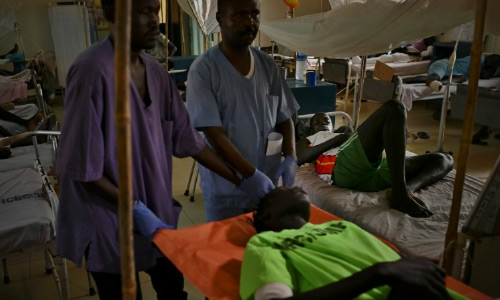JUBA - The cattle rustlers were asleep, resting ahead of a raid, when automatic gunfire tore through their camp. Ambushed by rival herdsmen, encircled and outgunned, they were cut down, one by one.
Koba Ngacho was lucky. Shot three times and left for dead, the young rustler was found alive in the carnage, the bullets having missed his vital organs, and airlifted to Juba for surgery.
"I'm grateful to be alive," the 20-year-old told AFP as he was wheeled to one of the few operating theatres in South Sudan equipped to deal with complicated gunshot injuries.
In February, after months of protracted negotiations, President Salva Kiir and his rival Riek Machar joined forces in government, drawing a line under a long-running conflict that left around 380,000 people dead.
South Sudan's civil war may have been declared over. But armed violence has anything but slowed in the troubled young country awash with guns, and riven by ethnic turmoil.
"This is unconscionable," he told reporters in Juba on March 9 after visiting Pibor, where 8,000 civilians -- mainly women, children and the elderly -- have sought shelter at a UN base.
Large-scale battles between government and rebel forces ebbed considerably in the aftermath of a September 2018 ceasefire between Kiir and Machar, who is once again vice-president in a unity government with his old rival.
But in 2019, the International Committee of the Red Cross actually treated more patients for serious gunshot wounds than the previous year -- 769 compared to 658.
The fear is that 2020 could follow the same trajectory.
Since December, UN peacekeepers have been deployed to Jonglei, greater Tonj in the northwest, and Rumbek, in central South Sudan, where ethnic violence has left scores dead and wounded, and thousands more on the run.
Every bed is taken at the ICRC ward at Juba Military Hospital, where Ngacho, a Murle cattle raider from Jonglei, nervously awaits his turn.
"I don't want to go back," said Peter Majok, a softly-spoken 22-year-old, propped up in a wheelchair after being shot by cattle raiders.
"If I go home... they'll come and shoot me." (AFP)
Home » World » South Sudan’s Road to Peace Marred by ‘Unconscionable’ Violence
South Sudan’s Road to Peace Marred by ‘Unconscionable’ Violence

